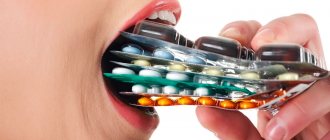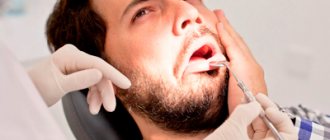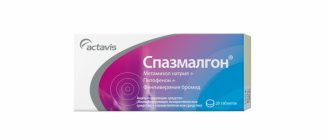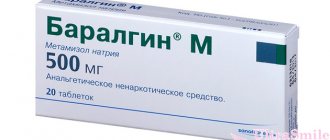On the scale of assessment and tolerance, toothache is one of the most severe, along with pain during childbirth and ear pain. And naturally, dentists urge people not to let the condition reach a catastrophic state, when excruciating pain occurs, tissue swelling occurs and emergency intervention is necessary. You should visit the dentist at least once every six months to monitor your oral health. But situations in life are different, and sometimes toothache occurs, for example, after tooth extraction or during certain interventions, against the background of advanced carious processes that have led to complications.
To wait until you visit the doctor, especially if it’s a weekend, you’re out of town, or you can’t immediately go to a dental clinic, you need to reduce the pain and choose the best toothache pills for yourself. It’s worth warning right away that there are no ideal drugs, and they may not completely eliminate pain, because it is associated with serious destructive or inflammatory processes that are not eliminated. In addition, you should not take pills to relieve pain and do not consult a doctor. Any medications are only a temporary remedy to make things a little easier!
Medications that will help reduce pain should ideally be discussed and selected with a doctor to take into account all possible indications and contraindications, the specific situation and age. Some drugs are available only in tablets, others are in the form of powders, capsules or other dosage forms that are suitable for each specific situation. It is important not to exceed the doses prescribed in the instructions, even if the drug is not very effective, and do not mix medications with each other. To radically improve the situation, you need to see a dentist and treatment.
Will it help?
Of course, before taking painkillers for a toothache, you should assess the degree of pain and think about the potential consequences of taking medications. In fact, according to statistics, very few people think about these aspects as soon as they experience pain in the oral cavity.
The most important fact is that relieving toothache with tablets will only be a temporary solution. This approach will help alleviate the general condition, but only for a certain time.
It should also be noted that tooth pain is often accompanied by concomitant symptoms, which manifest themselves in inflammation of the gums, cheek area, increased body temperature and a feeling of general malaise. Many of the tablets help relieve secondary manifestations, but have no effect on the cause.
This is why in most cases a visit to the dentist will still be required. After all, the painkiller will simply reduce the level of pain, but not for long. Moreover, in many situations the ongoing disease will only gain momentum and the pain will increase. Therefore, there is no point in enduring without visiting a doctor for a long period with persistent toothache.
Diagnostics
Diagnosis of pulpitis takes place in several stages. The first is an examination of the oral cavity by a dentist. The patient's complaints about acute pain, the presence of injury or a carious cavity are taken into account. All this points to pulpitis. But it is impossible to determine the acute and chronic forms of the disease by one visual examination.
To determine the stage and type of pathology, the patient is prescribed an examination:
- X-ray.
- EDI or electroodontodiagnosis. This method allows us to identify the reaction of the pulp to the influence of electric current.
- Rheodentography. It is carried out to assess the blood supply to the dental pulp.
- Thermal test.
To make an accurate diagnosis, differential diagnosis of acute pulpitis is important. This is important so as not to confuse it with other diseases that have similar manifestations.
Types of strong painkillers for tooth pain
For toothache, different types of painkillers can be used. Let's list:
- Tablets are used to influence the pain epicenter. They can dull the discomfort for several hours.
- The powder is gentle on the gastrointestinal tract and has anti-inflammatory and antipyretic effects.
- Toothpaste helps with increased sensitivity of tooth enamel. That is, if there is caries, pain relief will not occur. In the first case, it is enough to brush your teeth regularly.
- The gel is also able to temporarily relieve toothache due to its local anesthetic effect.
FAQ
Why does toothache occur?
Tooth pain is caused by a number of circumstances and dental diseases. Let's look at them in more detail:
Hyperesthesia
This is excessive tooth sensitivity that occurs when the enamel layer is worn away. Pain occurs when the tooth is exposed to cold, hot or sour food.
Traumatic fractures
When a tooth is injured, part of the crown often breaks off and the nerve is exposed, which leads to severe, often aching pain.
Caries
This is the most common infectious dental disease. Caries gradually destroys the tooth. Often, caries pain occurs in response to eating cold or hot food. If caries is not treated, the tooth is completely destroyed.
Pulpitis
With pulpitis, the patient experiences severe and acute pain. Often attacks of pain occur at night. If pulpitis is not treated, the disease goes into a chronic stage, in which the pain is not so strong.
Periodontitis
This is an acute or chronic purulent inflammation of the periodontium - the tissue around the tooth root. With periodontitis, the patient is bothered by severe sharp pain. If left untreated, periodontitis becomes chronic.
Let's go through the list
This material is not an advertisement for any products, so we will list the most suitable solutions in tablets for toothache in alphabetical order:
- Analgin.
- Ibuklin.
- Ketanov.
- Ketorol.
- Moment.
- Nise.
- Nimesil.
- Nurofen (ibuprofen and drugs identical to this group).
- Sanaprox.
- Tempalgin.
Ketanov is considered one of the most suitable options when asking what you can drink for toothache. It has a sufficient speed of impact, that is, fast, and at the same time effective. In some cases, such tablets help relieve even severe pain. But you should remember about the frequency of administration and dosages.
Nurofen not only helps relieve pain, but also has an anti-inflammatory and antipyretic effect on the entire body. You should be aware that some of the modifications of these toothache tablets contain a potent substance in the form of codeine. We are talking about variations of Nurofen Plus and Nurofen Plus N. It will also enhance the analgesic effect. The classic version can be used to relieve toothache in both adults and children.
A simple option with classic toothache tablets in the form of Analgin is also popular in the fight against this disease. The main substance here is sodium metamizole, which, due to its acidic structure, has a negative effect on enamel. For this reason, if there is damage in the latter, the area of carious lesions may increase. But if the filling falls out or is chipped, it will be effective.
Causes
The reasons for the development of pathology may be the following:
- Tooth injury, mechanical or chemical. Violation of the integrity of enamel and dentin makes the pulp extremely vulnerable to the effects of the external environment and pathogenic bacteria.
- Gum diseases. In this case, there is a high risk of infection entering through open periodontal pockets.
- Complications of caries. Uncured caries or its advanced form contribute to the entry of pathogenic microorganisms - streptococci - into the pulp through the dentin tubules.
- Incorrectly performed dental treatment - damage to dental tissue, opening of a tooth performed in violation of technique, burn of dental tissue by arsenic, etc.
- Incomplete removal of carious tissue during treatment. The infection persists in the dental cavity and continues to develop.
- Poor quality filling installation. It is dangerous because there is a gap between the tooth wall and the filling material. Through it, pathogenic microorganisms penetrate into the pulp.
About contraindications
Any doctor will tell you that any painkillers for toothache also have a negative effect on the body. This is due to the fact that they involve the functioning of the gastrointestinal tract, kidneys, liver, cardiac and nervous systems. But side effects are observed when pills and other types of drugs are taken incorrectly or when treatment regimens are not followed.
Main contraindications for toothache tablets:
- individual intolerance;
- pregnancy;
- lactation period;
- ulcer;
- heart failure;
- kidney or liver problems;
- asthma;
- problems with the circulatory system;
- childhood.
In fact, the body can react individually to the action of substances, so before taking any painkillers you should read the instructions, and, if possible, also consult a specialist.
Treatment of acute pulpitis
Treatment goals:
- stop a pain attack;
- eliminate inflammation and stop the infectious process;
- restore the anatomical shape of the tooth.
When dealing with acute pain, the patient is prescribed painkillers to reduce pain until the dental appointment.
The disease is treated in two main ways - conservative or biological and surgical. In both, therapy is carried out with preliminary anesthesia. The injection is given approximately 30 minutes before the start of treatment. For anesthesia, a solution of lidocaine or trimecaine is most often used.
Conservative method of treating acute pulpitis
The main goal is pulp preservation. The doctor conducts step-by-step treatment:
- gives an injection for pain relief;
- removes necrotic dentin;
- opens the tooth cavity;
- treats with antimicrobial agents;
- lays down medicine;
- puts a filling.
Conservative therapy is carried out mainly in young patients. This method requires mandatory consideration of the presence of diseases of the oral mucosa, as well as the localization of caries.
During treatment, anti-inflammatory drugs are used - Calcidont, Dical. Preparations containing calcium hydroxide are necessary to stimulate dentin formation. Proteolytic enzymes are necessary for tissue regeneration and swelling removal. After placing the medicine, the dentist closes the tooth cavity for several days - from 3 to 5. Next, if there is no reaction of the pulp, a permanent filling is placed.
Operative or surgical method
The doctor carries out the following stages of treatment:
- Provides first aid for acute pain.
- Gives an injection for pain relief.
- Opens the dental cavity.
- Removes pulp.
- Treats the cavity with an antiseptic.
- Puts in medicine.
- Installs a seal.
This method is used to treat acute diffuse pulpitis. If acute focal pulpitis is diagnosed, treatment involves removing the ostial and coronal pulp, while preserving the root pulp.
Surgical treatment is carried out in one or two visits.
For surgical treatment in one visit, the order is as follows:
- The doctor administers anesthesia and removes necrotic tissue.
- Using instruments, the tooth is filled with a non-toxic material.
When undergoing surgical treatment in two rooms, the procedure has a different procedure:
- First, the dentist applies arsenic or a devitalizing paste containing arsenic to the affected area of the tooth. This is necessary to kill the inflamed nerve. The duration of installation of arsenic on a diseased tooth is 24 hours on a single-root tooth, up to 48 hours on a multi-root tooth. Some types of pastes can be left for a long time - up to 7 - 15 days.
- A tampon with an anesthetic is placed in the canal and a temporary filling is placed. The patient is sent home.
- At the second visit to the dentist, the doctor extracts the arsenic or paste, completely removes the pulp and fills the tooth cavity.
The surgical treatment process is always monitored by radiography.
Side effects
Symptoms of a drug overdose may include the following:
- attacks of nausea and headache;
- decreased appetite and tone;
- overexcitation of the nervous system;
- sometimes drowsiness and apathy;
- gastrointestinal disorders in various forms;
- interruptions in the heart;
- bronchospasm;
- noise in ears;
- allergic rashes;
- kidney disorder - anuria;
- leukopenia;
- convulsions.
If you find the listed symptoms of a drug overdose, you should immediately rinse your stomach, take activated charcoal, drink plenty of fluids and contact an ambulance.
Dental antibiotics for periodontal disease and periodontitis
Antibacterial drugs are often used in treatment regimens for periodontal disease. Moreover, each clinical case requires a special approach. Therapy is aimed at restoring normal microbial flora. Antibiotics are prescribed in the form of tablets, injections, ointments, and gels. The medicine is selected by a periodontist taking into account the severity of damage to periodontal tissues and the results of a diagnostic examination.
It is necessary to distinguish between periodontal disease and periodontitis, despite the similarity of symptoms:
- unpleasant odor;
- soreness;
- swelling, bleeding gums;
- feeling of unpleasant taste;
- pathological mobility of teeth.
Periodontitis is a consequence of exposure to pathogenic bacteria. Whereas periodontal disease often develops against the background of a metabolic-dystrophic disorder. Other provoking factors of pathology:
- genetic predisposition;
- pathological bite;
- gum injuries due to incorrectly selected dentures and crowns;
- deposits in subgingival pockets;
- hormonal imbalance;
- gastrointestinal exacerbations;
- infectious respiratory diseases;
- abnormal attachments of the frenulum;
- diabetes.
Although there are some differences, both diseases can lead to complete tooth loss. Severe forms require long-term treatment, including antibiotic therapy. Antibiotics used in dentistry for periodontitis and for the prevention of periodontal disease are prescribed in a course (up to 10 days), in the form of tablets, injections and topically.
Proper oral hygiene and nutrition are of great importance. If there is a deficiency of macro- and microelements in the body, an effective drug is selected. Professional teeth cleaning, at least 2 times a year, and regular removal of microbial plaque with high-quality pastes will prevent the development of periodontal disease.
Which ones are better to choose for aching pain?
You should not take medications on your own
When selecting a remedy, the doctor is guided by the characteristics of the patient’s body, the nature of the pain and other factors.
You should not take medications on your own, since several versions of painkillers that have the same active substance have different effects on vital systems.
In addition, the operating principle of anesthetics is different, which requires careful selection of the drug for each type of pain:
- The following will help eliminate mild pain: Aspirin, Paracetamol, Analgin.
- For aching pain, medications such as Spazmalgon, Papaverine, No-Shpa are recommended.
- The following drugs can relieve pain as quickly as possible: Efferalgan, Solpadeine, Solpadeine Active, Nurofen, Next, Nimesil.
Modern technologies for administering anesthesia
The pain of the anesthesia itself, as well as its effectiveness, depend 90% on the skill of the dentist. A professional doctor will make every effort and use various techniques to make the patient feel comfortable. However, all people are different, each has their own pain threshold, and that is why an individual approach not only to the concentration of drugs, but also to premedication before the direct administration of anesthesia is very important.
Today, special anesthesia devices have been developed to help doctors. Naturally, they work under the supervision of a specialist. The electronic system is equipped with special pressure sensors - to avoid pain, the anesthetic must be injected very slowly and immediately after puncturing the tissue. The device is equipped with special needles with a very thin double tip, which again reduces pain.
In addition, by administering a small dose of anesthetic, a kind of allergy test is performed - the doctor assesses the condition of the soft mucous membranes (swelling, redness, rash) and the patient’s general reaction, and the pressure force is controlled by the device.
Safe, painless and effective treatment without pain! Treatment is carried out under the supervision of anesthesiologists capable of providing first aid. Special equipment monitors indicators of the general condition of the body.
If there is any threat, the ambulance station is 800 meters from the clinics! You are under the reliable protection of professionals.
Enroll now











